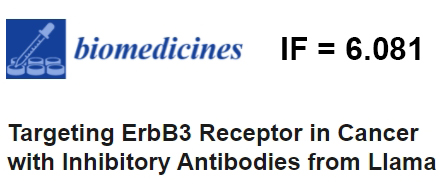Press-room / news / Science news /
Development of single-domain inhibitory antibodies targeting the ErbB3 receptor for cancer therapy
The human ErbB3 receptor is an important pharmacological target in the treatment of various types of cancer. A variety of anti-ErbB3 monoclonal antibodies are currently in development and are classic immunoglobulins. However, the search for new sources of antibodies or nanoantibodies consisting only of the heavy chain is being conducted more and more actively. Thus, in this work, a team of scientists from the Laboratory of Biocatalysis of the IBCh RAS, together with colleagues from the Laboratory of Renewable Energy Sources of the Academic University discovered a group of new single-domain llama antibodies targeting the extracellular domain of ErbB3 using the phage display method. It was found that the single-domain antibodies are not only highly affine for various receptor epitopes, but also have an inhibitory effect on the growth of tumor cells expressing ErbB3.
The three single-domain antibodies named BCD090-P1, BCD090-M2, and BCD090-M456, showed extreme stability and high affinity for the ErbB3 receptor. Thus, in experiments on surface plasmon resonance, the two most effective antibodies, BCD090-P1 and BCD090-M2, bound the extracellular domain of ErbB3 with an affinity of 1.6 nM and 15 nM for monovalent interaction. Receptor binding was also confirmed by immunofluorescence confocal microscopy in four different ErbB3 cancer cell lines. By characterizing the binding of antibodies to receptors, the authors showed that antibodies BCD090-P1 and BCD090-M2 non-competitively bind to two different receptor epitopes. In addition, BCD090-M2 directly blocks ligand binding, whereas BCD090-P1 does not compete with the ligand and presumably acts through a separate allosteric mechanism. In in vitro experiments, both antibodies inhibited ErbB3-induced proliferation of MCF-7 breast adenocarcinoma cells and SK-BR-3 cells overexpressing HER2. The authors suggest that these single-domain llama antibodies can be used to create new pharmacological drugs against ErbB3 or ErbB2/3.
This work was financially supported by the Ministry of Science and Higher Education of the Russian Federation (No. 0791-2020-0006) and ZAO Biocad and published in the journal Biomedicines.
november 11, 2021


